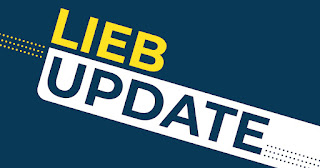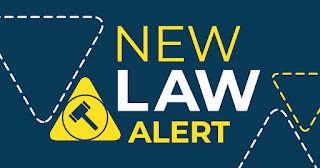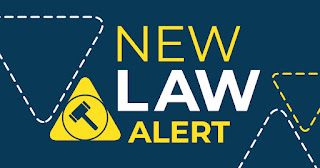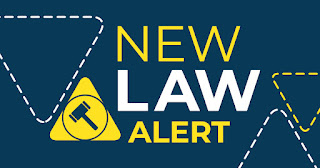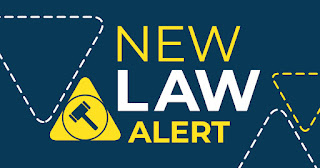Thursday, December 09, 2021
Monday, December 06, 2021
For years, businesses have taken advantage of consumers with predatory fees added to gift cards and gift certificates. But this Holiday Season, extra fees on gift cards will get businesses on Santa’s Naughty List!
The New York State Legislature passed a Bill amending section 396-I of the general business law, which bans businesses from charging additional fees on gift cards. The fees mentioned in the Bill include activation fees, retroactive fees, redemption fees, service fees, dormancy fees, latency fees, administrative fees, handling fees, access fees, periodic fees, renewal fees, re-loading fees, or any fee of any kind for gift cards.
The Bill goes further in its consumer protections. Businesses are banned from selling gift cards where the balance declines over time or declines for nonuse. And if signed into law, it will be unlawful for businesses to sell gift cards with expiration dates unless it’s a promotional gift certificate that expires nine years after its issued and the expiration date is clearly stated.
Perhaps the most joyous aspect of this holiday-timed Bill is, consumers will be given the ability to redeem for cash value the remaining balance on a gift card if the remaining value is less than five dollars. However, there is an exception if the gift card is an open loop or promotional certificate.
While the holidays may be on our minds, it’s important to note that the Bill covers several types of gift cards that can be used across many types of businesses all year round.
Governor Hochul has until December 8th to sign the Bill into law. Once signed, the law will come into effect in one year.
If caught in violation of the law, businesses can be held liable for compensatory damages, punitive damages, penalties and attorneys’ fees being awarded to the victim. If you believe that you were subjected to this kind of unlawful business practice by a merchant, your lawyer will be able to determine its involvement during the lawsuit and leverage the business’s non-compliance with the NYS Bill to win your case.
New York City Mayor de Blasio announced, through the media, new vaccine mandate requirements for New York City’s five boroughs. Starting December 27th all private-sector workers will be required to show proof of vaccination. This is the first vaccine mandate in the nation that applies to all private sector workers. Approximately 184,000 businesses will be affected. Mayor de Blasio called the new measures a “preemptive strike” in facing the new challenges associated with the Omicron variant, the colder weather affecting the delta variant, and holiday gatherings.
Additional measures include, requiring children ages 5-11 to
show proof of one vaccine dose for indoor dining, fitness, and entertainment
and requiring individuals 12 and older to show proof of two vaccine doses unless
they received the Johnson & Johnson single vaccine dose. These measures are effective as of December 14th.
Mayor de Blasio called the measures universal in their enforcement
and is confident that this expansion to “Key to NYC” Program will overcome any
legal challenge.
Mayor de Blasio said the city’s health commissioner has put these new vaccine requirements into place. However, New York City’s Department of Health
has not yet published the order detailing the requirements of the new mandate.
Issues involving the enforcement of these private-sector
vaccine mandates will likely be something mayor-elect Eric Adams will have to deal
with next year.
The 15 public school teachers who challenged New York City’s COVID-19 vaccine mandate live to fight another day in court.
The teachers have refused to comply with the City’s mandate arguing that compliance with the COVID-19 vaccine mandate is a violation of their religious rights under the First Amendment’s free exercise clause.
The Court determined that the reasonable accommodation standards in the City's vaccine mandate was unconstitutional as applied to the 15 teachers because the mandate required employees who requested a religious exemption to the COVID-19 vaccine mandate to submit a letter from a religious leader confirming the validity of the employee's religious beliefs. If the religious leader had well-documented public comments in support of taking the vaccine, the request for exemptions would be denied.
The Court reasoned as follows:
Denying an individual a religious accommodation based on someone else's publicly expressed religious views-even the leader of her faith-runs afoul of the Supreme Court's teaching that "[i]t is not within the judicial ken to question the centrality of particular beliefs or practices to a faith, or the validity of particular litigants' interpretations of those creeds."
However, the Court declined to extend protections against the mandate to all teachers stating that the mandate itself was "a reasonable exercise of the state's power to act to protect the public health."
Based on this decision, employers should only consider the employee's specific religious beliefs (in determining whether they are "sincerely held") when processing a reasonable accommodation request. Someone else's belief - even if it is a religious leader - is irrelevant.
Wednesday, November 24, 2021
Wonder why you were denied the last job or promotion you applied for?
Wonder no more, because there is a good chance that it wasn't a human's decision. In fact, Artificial Intelligence "AI" has become the judge on who is hired or who is promoted for most employers and employment agencies. However, AI isn't perfect and may be infringing on your anti-discrimination rights if it's not properly programmed and regularly audited.
That is why AI or Automated Employment Decision Tool "AEDT" has been the target of much scrutiny. Experts point out that AEDT are prone to bias in their hiring and promotion process. Biases include racial, sexual, and ethnic discrimination, amongst so many other protected categories. This problem has become so worrisome that New York City is putting in place an amendment to the New York City Administrative Code to curb the use of AI in hiring.
Such amendment was approved by the New York City Counsel on November 10th, 2021. It can be read here. The purpose of the Bill is to require employers and employment agencies to assess employees and candidates without the use of machine learned biases. The effects of such machine learned biases are discriminatory in nature.
Now, the Bill is on the Mayor's desk and goes into effect on January 1, 2023.
The Bill is limited to regulating AI decisions that screen candidates for employment or screen employees for promotion. This limitation is not without exception. An AEDT is allowed if the tool has undergone an independent bias audit no more than one year prior to it use. The audit's summary then must become publicly available on the employers' or employment agencies' website.
But how will you know if the employer or employment agency is using AEDT on you? The law enforces notification guidelines that will inform employees and candidates of its use.
If caught in violation of the law, employers and employment agencies face fines of up to $500 for the 1st violation, and fines between $500 to $1,500 for each subsequent violation. Plus, they may be exposed to a discrimination lawsuit with compensatory damages, punitive damages, penalties and attorneys' fees being awarded to the victim. If you believe that you were discriminated against by an AI / AEDT, your lawyer will be able to determine it's involvement during the lawsuit and leverage the company's non-compliance with the NYC Bill to win your case.
Monday, November 22, 2021
On November 18, 2021, the NYS Board of Real Estate continued its mission of optimizing the regulation of real estate brokers in our state by holding its meeting.
To remind real estate brokers and salespersons, the public is welcome at these meetings where the public can bring comments from the floor. Its encouraged that Lieb School students attend these meetings to have your voices heard.
"[T]he Board has general authority to promulgate rules and regulations affecting real estate brokers and salespersons in order to administer and effectuate the purposes of Article 12-A of the Real Property Law."
A complete video of the meeting is available on youtube.
In summary, the following was discussed:
- Exam Results - January through September 2021:
- Salesperson = 20,046 applicants with a pass rate of 54%
- Broker = 1,477 applicants with a pass rate of 57%Order U
- License Enforcement - July through November 2021:
- Complaints = 273
- Investigations Completed = 188
- Closed (no violations) = 26
- Closed (warning / instruction letter) = 31
- Closed (private resolution) = 7
- Closed (abandoned) = 16
- Closed (duplicate) = 9
- Closed (insufficient evidence) = 51
- Closed (civil matter jurisdiction) = 7
- Hold (licensee action required prior to renewal) = 13
- Referred for Disciplinary Prosecution - 28
- Live distance education is still permitted
Thursday, November 18, 2021
Wednesday, November 17, 2021
As you may recall, on May 5, 2021, the NY HERO Act was signed into law in order to protect employees against exposure and disease during a future airborne infectious disease outbreak. The HERO Act requires employers to take certain measures to protect their employees in the event of future airborne infectious disease outbreaks, which includes requiring employers to have an exposure prevention plan in place in the event of a future outbreak.
As previously reported on this Blog, regulation 12 NYCRR 840.1 entitled "Airborne Infections Disease Exposure Prevention Standard" was proposed over the summer to assist employers in adopting an exposure prevention plan.
Although 12 NYCRR 840.1 has not yet been approved, the New York State Dept. of Labor has enacted an emergency regulation so that 12 NYCRR 840.1 can be immediately adopted.
Regardless of whether or not 12 NYCRR 840.1 is ultimately approved, employers should still have an exposure prevention plan in place. However, to err on the side of caution and to avoid a whirlwind of possible future lawsuits, employers should comply with the requirements set forth 2 NYCRR 840.1, especially in light of the Dept. of Labor's recent actions in proposing an emergency regulation to adopt 12 NYCRR 840.1.
Clearly, the Dept. of Labor is gravely concerned about the possibility of future airborne infectious disease outbreaks and their patience is running thin.
If you agree or disagree with the Dept. of Labor's emergency regulation, you can make your voice heard by emailing Michael Paglialonga, Dept. of Labor, at regulations@labor.ny.gov, by December 31, 2021.
Friday, November 12, 2021
On November 10, 2021, Federal Regulators issued a statement
that lenders will no longer be afforded leniency with complying with mandatory mortgage
servicing practices.
As background, Federal Regulators had previously issued an
April 2020 Joint Statement, in response to COVID, that they would not take
supervisory or enforcement action against mortgage servicers for failing to
meet certain borrower-protective timing requirements so long as the servicers
made good faith efforts to provide those required notices or disclosures and
took the related actions within a reasonable period.
Now, as of November 10, 2021, Agencies will apply their
respective supervisory and enforcement authorities, to address noncompliance or
violations of Regulation X’s mortgage servicing rules.
Borrowers, who are looking for leverage in negotiating
mortgage modifications, short sales, and deed-in-lieu workouts should be
brushing up on Regulation X today.
Thursday, November 11, 2021
With the foreclosure and eviction moratoriums coming to an end in January 2022, New Yorkers are about to feel pinched in their housing costs, which may turn into utility billing issues.
New Yorkers just received increased rights and
beginning on December 8, 2021, utility companies are prohibited from engaging
in harassment, oppression, or other abuses towards residential customers in
connection with deferred payment agreements and the collection of unpaid
balances.
Bill A3359 was signed by
Governor Hochul on November 8, 2021 and amends §53-a of the Public
Service Law.
Wednesday, November 10, 2021
As you may recall, a proposed bill (A2382) was submitted to Gov. Hochul last month, seeking to amend the CPLR & Judiciary Law concerning predatory debt collection practices & consumer actions, as discussed in our blog here.
On November 8, 2021, Gov. Hochul signed bill A2382 into law.
"When bad actors try and take advantage of consumers, New York will fight back. I'm proud to be signing legislation that will protect New Yorkers from unscrupulous practices by debt collectors and utility companies." -Gov. Hochul.
This is huge news considering the new legislation will undoubtedly protect debtors from abusive debt collection practices.
How big of an impact will this new legislation have on overall debt collection practices in New York?
Stay tuned....
Starting January 2, 2022, borrowers negotiating a loan modification have a right to a single point of contact at their lender.
On November 3, 2021, Governor Hochul signed BillS671 into law, which amends Section 6-o to the banking law, and starting on January 3, 2022, upon written request by the borrower, lenders will be required to provide borrowers with a single point of contact who must provide accurate account and other information related to the foreclosure process and loss mitigation efforts.
This is huge because many mortgage modifications are
functionally blocked by a lack of access to lenders rather than based upon
qualification criteria. As the foreclosure moratorium is coming to an end on
January 15, 2022 and a wave of foreclosures are about to hit New York State,
this is a needed law for borrowers, and their attorneys, to settle cases.
Tuesday, November 09, 2021
Starting May 7, 2022, if you wish to electronically monitor your employees, you will need to provide statutory notice first.
On November 8, 2021, Governor Hochul signed Bill A430 into
law, which amends Section 52-c to the Civil Rights Law, and starting on May 7,
2022, employers with a place of business in New York who monitor or otherwise
tap telephone calls, e-mails, or internet access of an employee by any
electronic device or system, must give prior written notice upon hiring to all
employees. Additionally, each employer must also post the notice of electronic
monitoring in a visible place which is readily available for viewing by its
employees.
Any employer found to be in violation of this Bill will be
subject to a maximum penalty of $500 for the first offense, $1,000 for the
second offense, and $3,000 for the third and each subsequent offense.
On November 6, 2021, the 5th Circuit Court of Appeals stayed the OSHA Vaccine Emergency Temporary Standard (which we explained in this blog). However, the Circuit set a short briefing schedule and required the Government to respond to petitioners' motion for a permanent injunction by 5:00 PM on November 8th, which they did, and the petitioners to reply by 5:00 PM on November 9th, which they did.
However, the stay seems to be a splashy headline about absolutely nothing. Specifically, the Emergency Temporary Standard's compliance date is not until January 4, 2022 and it impossible that the legality of the Emergency Temporary Standard is not determined before then. More so, as the Government points out, in great detail within their response, this case will be in Multidstrict Litigation "on or about November 16—21 days before the December 7 date that petitioners allege is the earliest date that any employee could be required to receive a vaccine and 51 days before petitioners’ employees would be required to start testing." Here, the 5th Circuit choosing to go it alone, is really strange.
Regardless, the ultimate determination in this case will likely involve a ruling as to whether the United States Code (29 USC 655(c)), permitted OSHA to issue the vaccine Emergency Temporary Standard. The applicable Code section reads:
OSHA shall provide, without regard to the requirements
of chapter 5, title 5, United States Code [5 USCS §§ 500
et seq.], for an emergency temporary standard to take
immediate effect upon publication in the Federal Register
if he determines (A) that employees are exposed to grave
danger from exposure to substances or agents determined
to be toxic or physically harmful or from new hazards, and
(B) that such emergency standard is necessary to protect
employees from such danger.
Stated otherwise, the question before the Multidistrict Court is going to be whether OSHA has power to issue the Standard. To get to that answer, it is helpful to understand that a grave danger means one that causes "incurable, permanent, or fatal consequences to workers, as opposed to easily curable and fleeting effects on their health," according to precedent.
Now, to make matters even more interesting, even if OSHA loses on this Emergency Temporary Standard before the Multidistrict Court, it can nonetheless issue a vaccine requirement through traditional rulemaking so long as such a requirement is "'reasonably necessary or appropriate' to address a 'significant risk' of harm in the workplace." As you can see, we are just in the starting gate and this horse race hasn't yet even started. Stay tuned.
Thursday, November 04, 2021
The Occupational Safety and Health Administration ("OSHA") issued its long awaited emergency temporary standard requiring all private sector employers with 100 or more employees ("covered employers") to "develop, implement, and enforce a mandatory COVID-19 vaccination policy." OSHA issued separate rules for federal contractors/subcontractors and health care workers.
The OSHA rules require all covered employers to ensure their employees are vaccinated by January 4, 2022 or undergo weekly testing for COVID-19 and wear face coverings while at work (There is no testing option for health care workers).
Employers do not have to require employees to get vaccinated or be tested weekly if they: 1) report to a workplace where no other individuals are present; 2) work entirely from home; or 3) work exclusively outdoors. In addition, the rules provide for a reasonable accommodation for employees who have a disability or sincerely held religious belief (where there is no undue hardship to the employer).
The rules also require covered employers to do the following:
- obtain and preserve records of employee vaccination/testing which must be provided to employees, employee representatives and OSHA upon request;
- provide employees with up to four (4) hours of paid time off to receive their vaccine dose(s);
- provide reasonable time off and paid sick leave for employees to recover from side effects experienced from receiving the vaccine;
- require employees to notify the employer when they are diagnosed with COVID-19 and remove all employees who are positive from the workplace until they meet certain criteria;
- require all unvaccinated employees as of December 5, 2021 to wear masks (they must be vaccinated by January 4, 2022).
- report all COVID-19 fatalities and hospitalizations to OSHA;
Aside from the vaccination/weekly testing requirements, all of the other rules take effect on December 5, 2021. Covered employers should, thus, immediately work with counsel to begin creating and implementing a policy in compliance with these new rules. Covered employers who fail to comply with these rules can face fines in the amount of $13,653 per violation or $136,532 per violation if the conduct is willful or repeated.
Starting September 1, 2022, prospective buyers of newly built one or two-family homes will now become aware of the possibility of a fire damaging their home, and have the opportunity to reduce this risk prior to even beginning construction.
On November 4, 2021, Governor Hochul
signed Bill
S1383 into law, which amends Section 759-a of the General Business Law.
Beginning September 1, 2022, builders of one- or two-family homes with less
than three stories will be required to provide a buyer with a cost estimate for
the installation and maintenance of an automatic fire sprinkler system. The
builder must also provide a copy of written materials prepared by the office of
fire prevention and control which details the benefits of and includes factors that
can affect the costs associated with the installation and maintenance of an
automatic fire sprinkler. If the buyer requests the installation of the
automatic fire sprinkler system, the builder shall install it at the buyer’s
expense.
Fire Sprinkler systems are an
effective device in the event of a fire and are not uncommon. Many structures such
as commercial buildings and multi-family homes are required to install such
devices in the State of New York. The justifications for this bill seem very convincing,
and this bill will allow prospective homeowners who are planning new
construction with a cost estimate for installation of a fire sprinkler system
which could ultimately, save their house or even more importantly, their lives.
Monday, November 01, 2021
As of January 28, 2022, NYS insurers are prohibited from refusing to issue or renew, cancel, or charge or impose an increased premium for homeowners' insurance policies based on the breed of a dog owned.
Nonetheless, Insurance Law 3421 now provides an exception where insurance can be modified if a breed or mixture of breeds is designated as a dangerous dog pursuant to Agriculture and Markets Law 123, which requires such designations to be made by sound underwriting and actuarial principles, rather than fear alone.
Governor Hochul signed this legislation, S4254, on October 30, 2021.
Friday, October 29, 2021
Wow, as of October 22, NYS is now permitting felons to serve as Executors of Estates by way of A2573A.
Previously, a Petition for Probate required an Affirmation as to whether the applicant has been convicted of a felony and if they had, they'd be denied Letters Testamentary (appointment as the estate fiduciary).
According to the Bill's Justification, the purpose of this new law is to respect the decision of the decedent. Specifically, the Justification states:
In most instances the court respects the choices made by the creator of the document and appoints the nominated parties. It is detrimental to grieving families when an individual is prohibited from acting as an executor due to his or her conviction after paying their debt to society.
That being said, this new law is not without any restrictions whatsoever. Specifically, the law enables the Court to nonetheless declare a felon ineligible if their "crime may be adverse to the welfare of the estate, including but not limited to, crimes such as embezzlement or any crime where there was a misappropriation of money or a breach of fiduciary duty."
Before the US Supreme Court on Monday, November 1, 2021, is Texas's abortion law, which seems to be about stopping abortions by changing the standard from viability, as is the current law under Roe v. Wade, to 6 weeks into pregnancy, but it's about so much more and you should really care.
The law deputizes Texans to police their neighbors in a way that should ring out fears that we are transitioning into a dystopian society like a real-world Handmaid's Tale.
Imagine for a second, if you can, that this law has nothing to do with abortions (regardless, if you are pro-life or pro-choice) and ask yourself, how do you feel about your neighbors receiving $10,000 for catching you speeding on the highway, or shoplifting, or putting an extension on your house without a permit. In Texas, if you catch someone violating the 6-week abortion rule, you can get paid $10,000. Crazy.
Ironically, Texas's law has survived scrutiny under Roe v. Wade because of this unique enforcement scheme. In fact, the US Supreme Court previously denied an application for injunctive relief, on September 1, 2021, by explaining that there was no "private-citizen respondent before us [who had] intention to enforce the law" [they sued the government rather than a citizen enforcing the law to get $10,000] and therefore, the Court ruled that there was a procedural hurdle preventing it from making "any conclusion about the constitutionality of Texas's law" when it comes to abortions.
Now, on November 1, 2021, the Court will hear arguments as to whether the "United States [may] bring suit in federal court and obtain injunctive or declaratory relief against the State, state court judges, state court clerks, other state officials, or all private parties to prohibit SB. 8 from being enforced." If they can stop a judge from granting the $10,000, they stop the law.
A proposed bill (A2382), awaiting Gov. Hochul's signature, seeks to amend the civil practice rules in NY (CPLR) & Judiciary Law concerning predatory debt collection practices & consumer credit actions.
Specifically, the Bill provides the following:
- Cut the statute of limitations on consumer credit transactions in half (i.e., from 6 years to 3 years);
- Require all consumer credit action pleadings to include additional information (i.e., name of original creditor, last 4 digits of account number on most statement, date & amount of last payment, etc.);
- Allow defendants to raise improper service as a defense (i.e., unwaivable);
- Require an additional notice of a pending consumer credit action be mailed to a defendant by clerk of the court; &
- Require additional steps for entry of default judgment against a debtor (i.e., affidavit by original creditor of facts related to debt/default in payment, affidavit of sale for every subsequent assignment of sale of debt to a third-party, affidavit of a witness of the plaintiff, including chain of title of debt, etc.).
Thursday, October 28, 2021
The Equal Employment Opportunity Commission ("EEOC") recently released new guidance on religious exemptions to COVID-19 vaccine mandates. The new guidance provides clarifications regarding employers' and employees' obligations, including the following:
- In requesting a religious accommodation, an employee must specify that there is a conflict between the vaccine requirement and their sincerely held religious beliefs.
- If an employer has an objective basis to question either the "religious nature or the sincerity of a particular belief," the employer can seek additional supporting information from the employee regarding their religious beliefs.
- Objections to COVID-19 vaccinations based on social, political or personal preferences do not qualify as sincerely held religious beliefs.
- In assessing whether it can deny an accommodation request based on an undue hardship, an employer should consider factors such as whether the employee: works outdoors or indoors, works in a group setting, has close contact with other individuals, as well as the number of employees seeking a similar accommodation.
- The employer can choose its preferred accommodation that would resolve the employee's conflict even if it is not the accommodation requested by the employee.
Tuesday, October 26, 2021
Governor Hochul signed Bill A07373 into law yesterday which permits employees to petition their employer (in writing, within ten (10) days after a layoff, or in advance of a layoff) to implement a "Shared Work" program in lieu of a layoff. While employers are not required to implement a Shared Work program, employers must respond to the employees' petition in writing within seven (7) days and may not discriminate or retaliate against any employees who bring a petition.
The Shared Work program was formed to assist employers in avoiding layoffs and maintain trained workers during an economic downturn by allowing employees to receive partial unemployment benefits while working reduced hours.
Be warned, the process just got a lot easier for a city / district court Judge to "order the removal of the building or an abatement of the condition" that is in violation of "any provision of the uniform code."
Previously, there was a functional impediment when cities, towns, and villages sought to obtain such an order from the Court. While zoning violations were typically brought in city or district court, only a Supreme Court Justice had the authority to order the removal of the building or an abatement of the condition in violation. This obstructed enforcement of violations.
Now, with A3028, having been signed into law on October 25, 2021, this is changed, and local courts, such as city and district courts, are empowered to render such an Order.
Construction can be a nightmare, which can get even worse when your contractor doesn't have insurance to compensate you for their mistakes and damage.
Based on A2202, which was signed into law by Governor Hochul on October 25, 2021, starting on April 23, 2022, contractors and subcontractors "shall disclose to the homeowner the existence of a property and/or casualty insurance policy that covers the scope of such contractor or subcontractor's employment should an insurance claim be filed resulting from losses arising from the work at such property. Such disclosure shall also include the contact information of the insurance company providing such property and/or casualty insurance, including a phone number and address."
While this is a move in the right direction, the damages for failure to comply are not enough to move the needle. It's expected that contractors will just ignore this law, as the cost of doing business, because the only damages available to a homeowner who doesn't receive information about the contractor's insurance is "a civil penalty not to exceed the greater of two hundred fifty dollars for each violation or five percent of the aggregate contract price specified in the home improvement contract; provided, however, that in no event shall the total penalty exceed twenty-five hundred dollars for each contract."
Maybe, it's time to up the penalty too so that the government can make a meaningful impact in protecting homeowners who work with unscrupulous contractors?
Have you ever wondered how the government assesses the value of your property for real estate tax purposes?
Yes, there are 3 different types of appraisals, including comparable sales, income capitalization, and cost basis. However, each uses sales data of similar properties to develop a value. But, what is the legal definition of similar properties for purposes of a tax assessment? That has long been a hotly litigated.
Now, starting on January 1, 2022, the answer will be that similar is defined as "properties located in proximate location to the subject property unless there is an inadequate number of appropriate sales or rentals within the same market." Plus, similarity refers to "age, condition, use or the sue at the time of sale, type of construction, location, design, physical features and economic characteristics including but not limited to similarities in occupancy and market rent."
This new law, A894C, was signed into law by Governor Hochul on October 25, 2021.
Monday, October 25, 2021
Effective January 26, 2022, A5144 will cause NYS private employees / independent contractors to have expanded whistleblower protection, under amended Labor Law 740, if they disclose or threaten to disclose, to a supervisor or to a public body, an activity, policy or practice of the employer, that the employee reasonably believes is in violation of law, rule or regulation or that the employee reasonably believes poses a substantial and specific danger to the public health or safety.
This expanded protection is not only for employees, but also for former employees and independent contractors. With independent contractor protection, real estate brokers should be on the lookout for their agents lodging complaints to the Department of State, amongst other bodies. It's therefore time for every private business in NYS to button-up its compliance protocol and avoid whistleblowers because silencing them is no longer possible. Beyond tightening up their policy manuals, employers will be required to post signage about this new law at their places of employment.
This law is huge for employee / independent contractor rights and it's going to get messy quickly with lots of lawsuits to follow in the near term. Think about how many times an employer previously leverages its position to blackball a whistleblower from the industry. Now, actionable retaliation includes adversely impacting a whistleblower's future employment.
This is huge, just watch the news and you will know how many whistleblowers are out there. Think about what's going on with Facebook. What about the Alec Baldwin shooting? Maybe, if New Mexico's law was as broad and protective as this new New York law, the Baldwin shooting / gun mishap wouldn't have happened. Yes, the film crew voiced complaints, but their position was limited. In New Mexico, an employee may not be discharged (or discriminated against) in retaliation for filing a complaint, instituting a proceeding, testifying in a proceeding, or exercising a right concerning violations of occupational health and safety standards. N.M. Stat. Ann. § 50-9-25. However, there is no private right of action (besides common law) and only the possibility of reinstatement and back pay if the secretary of environment chooses to pursue a retaliation claim. In contrast, a New York employee is now protected if they "reasonably believes [the employer's wrong] poses a substantial and specific danger to the public health or safety" and that employee can sue in their own name within 2-years of the retaliation while seeking back pay, front pay, a civil penalty, punitive damages, and attorneys' fees.
This law will launch a new era of compliance throughout New York industry. Is your business ready?
Wednesday, October 20, 2021
Upon the legalization of cannabis in New York State, Section 201-D of the New York Labor Law ("Discrimination against the engagement in certain activities") was amended to prohibit employers from discriminating against employees for using cannabis outside of the workplace on their own time.
The Department of Labor ("DOL") recently issued guidance (in the form of frequently asked questions) regarding certain elements of the law:
- Employee Discipline: While employers may not discipline employees for using cannabis while off-duty and off-premises, employers may take action against employees who "manifest specific articulable symptoms of impairment" on the job. The DOL guidance defines "articulable symptoms of impairment" as "objectively observable indications that the employee's performance of the duties of the position are decreased or lessened." For example: operating heavy machinery in a reckless manner would likely qualify. The DOL further specified that the following are not, without more, "articulable symptoms of impairment":
- positive test for cannabis;
- odor of cannabis; and/or
- other typical observable signs of cannabis use.
- Use at Work: Employers may prohibit cannabis use and possession during all work hours which include breaks and meals periods, even if the employee leaves the worksite, and when an employee is "on-call."
- Drug Testing: Employers may not test employees for cannabis outside of the following circumstances:
- It is required by state or federal law for a particular position;
- The employer would lose a federal contract or federal funding; or
- The employee manifests "specific articulable symptoms of impairment" (although an employer may not discipline an employee based solely on a positive test, as stated above).
Tuesday, October 19, 2021
This question is on the ballot on November 2nd.
The answer seems simple, but with early voting starting in New York this Saturday, October 23rd, have you considered the implications of Proposal 2 of the statewide ballot, to make New Yorkers have a constitutional right to "clean air and water, and a healthful environment?"
In 1996, the highest court in New York, the Court of Appeals, explained that a constitutional right may provide for an "action for damages for violation... against a government or individual defendants." However, the Court did not say that all constitutional violations give way to a damages action, in that case, Brown v. State. So, it remains unclear if courts will permit private citizens to be awarded damages from polluters if Proposal 2 is passed in the statewide ballot. That being said, Senator Robert Jackson, who sponsored Proposal 2, believes that the amendment will give New Yorkers "the right to take legal action for a clean environment," per BallotPedia.
Do you think that private citizens should be awarded damages for suing companies that damage our clean air, water and a healthful environment? Shouldn't the money go back to the State to fix the damage rather than into a private individual's pocket?
Where is the line?
Should truck drivers be sued if they don't switch to electric vehicles?
How about private jet passengers?
Shouldn't this be thought-out before we open the private lawsuit free-for-all?
Friday, October 15, 2021
Thursday, October 14, 2021
Starting on October 12, 2021, discrimination cases before the New York State Division of Human Rights (DHR) are no longer permitted to conclude with a private settlement.
Instead, if settlement is achieved, DHR is now requiring "complainant’s attorney [] to state in writing why they are seeking a discontinuance and, if the reason is private settlement, the discontinuance will not be granted." Rather, "the matter [will be resolved] through an Order after stipulation that indicates the terms of the settlement or to proceed through the agency’s public hearing process."
The purpose of this new rule, according to DHR, is "to ensure that the terms of any settlement comply with our basic standards and do not violate public policy."
Further, given that three-quarters of discrimination cases result in settlement, DHR will be able to collect better data of what is happening in resolving these disputes by monitoring settlements. Hopefully, DHR will actively compile this data and inform the public of their findings so that litigants can make smart, informed decisions, when settling cases into the future.
On October 8, 2021, Governor Hochul signed S6492 into law and now the five eastern towns (East Hampton, Riverhead, Shelter Island, Southampton and Southold) are authorized to establish community housing funds to be funded by a supplemental real estate transfer tax.
Before any additional taxes are going to be levied, each town's board will need to enact a local law to that effect.
Do you think that taxes should be raised on real estate sales to create affordable housing?
Before you answer that question, do you agree that the East End is unaffordable for much of its labor force?
The public purpose of this bill is "to establish a dedicated fund to provide needed housing opportunities" for "moderate income and working class local residents."
So, do you think your town should enact a local law, raise transfer taxes, and increase its supply of affordable housing?



